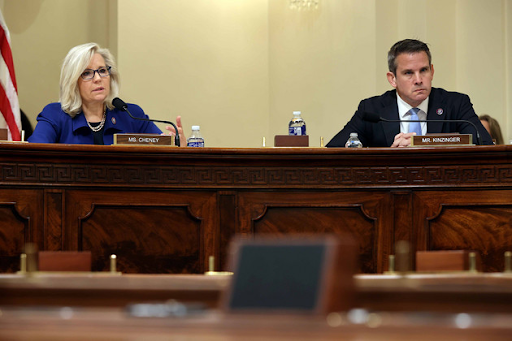RNC Censures Representatives Liz Cheney and Adam Kinzinger

Image Courtesy of Politico
By Chris Carey
Having concluded that January 6, 2021, and its fallout can be considered “legitimate political discourse,” the Republican National Committee (RNC) voted to censure the two members of its party in Congress who have consistently questioned the fateful day and its events.
Representatives Adam Kinzinger (R-IL) and Liz Cheney (R-WY) “crossed a line,” according to RNC Chairwoman Ronna McDaniel. She continued, distinguishing those who engaged in violence on January 6th and those who did not, saying, “they chose to join Nancy Pelosi in a Democrat-led persecution of ordinary citizens who engaged in legitimate political discourse that had nothing to do with violence at the Capitol.”
As the sole Republicans on the special committee established to investigate the January 6th events and determine causes, participants, and responsible parties, Kinzinger and Cheney have faced considerable backlash from their own party. This censure, which passed on Friday, February 4, 2022, serves as an official rebuke of the support given by the two conservatives to the largely-Democratic effort to paint the January 6th Insurrection as just that: an insurrection.
As far as the punitive power of the censure itself, the document states that the RNC will remove all support from the two members of Congress and they shall essentially be considered no longer members of the Republican Party.
Many prominent members of the Republican Party were quick to speak out against the censuring, particularly Senate Minority Leader Mitch McConnell (R-KY). McConnell said in a press conference on Tuesday, February 8, “it was a violent insurrection with the purpose of trying to prevent a peaceful transfer of power after a legitimately certified election. … that’s what it was.”
Along with Minority Leader McConnell, Senators Lindsey Graham (R-SC) and Mitt Romney (R-UT) made clear their frustrations with the measure and the sort of party division it will foment, as the Republicans move toward a midterm election ripe for regaining at least some control of Congress.
“Their resolution [said] that the job was to win elections. I agree with that. But then they go on to engage in actions that make that more challenging,” Senator John Cornyn (R-TX) said.
Along with the resolution, the RNC decided to back a pro-Trump primary opponent of Cheney’s, making for an interesting race and a non-negligible chance that she may lose her seat in Congress. Kinzinger, on the other hand, has chosen not to run for reelection following redistricting and the launch of his new Political Action Committee (PAC), Country First.
President Donald Trump responded to those defending Representatives Cheney and Kinzinger, releasing a statement reaffirming his support for the RNC’s initiative in censuring the two members of his own party.
“Mitch McConnell does not speak for the Republican Party, and does not represent the views of the vast majority of its voters. He did nothing to fight for his constituents and stop the most fraudulent election in American history,” Trump wrote.
This statement complemented a prior statement which read, “Congratulations to the Republican National Committee (RNC) and its Chairwoman, Ronna McDaniel, on their great ruling in censuring Liz Cheney and Cryin’ Adam Kinzinger, two horrible RINOs who put themselves ahead of our Country.”
Cheney’s Trump-backed primary challenger will certainly face an uphill battle financially; however, this matchup may be an indication of the party’s propensity toward granting Donald Trump the nomination in 2024. In the meantime, the Republican Party remains split over questions of the illegality of the events of January 6th, with many still denying its standing as a violent insurrection.






